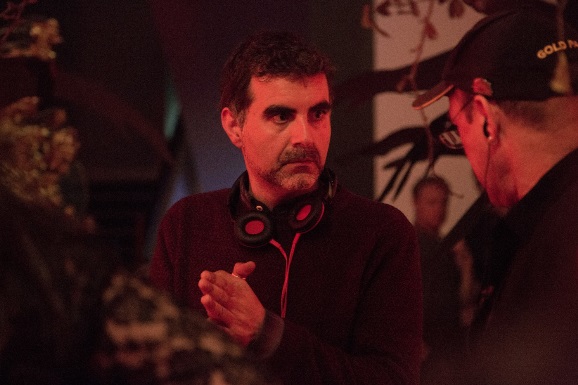Director Sotiris Dounoukos on the set of ‘Joe Cinque’s Consolation’.
In 1997, Canberra law student Anu Singh murdered her boyfriend Joe Cinque by lacing his coffee with Rohypnol and injecting him with heroin after a dinner party.
Some of the guests, mostly other students, had heard rumours of Singh’s plan. None of them warned Cinque.
The circumstances surrounding the crime and its subsequent trial are the subject of Helen Garner’s 2004 book, Joe Cinque’s Consolation – now adapted for screen by director Sotiris Dounoukos and his co-writer Matt Rubenstein.
The film, Dounoukos’s first feature, stars Maggie Naouri as Singh and Jerome Meyer as Cinque.
A Canberra native, Dounoukos has a personal connection to the story; he studied law at the Australian National University at the same time as Singh and she was a friend of a friend.
Reading Garner’s book left the director, like many others, with a sense of “profound sadness” and anger at the injustice of Cinque’s death, as well as many questions.
“About Anu’s state of mind and what was happening in their relationship,” Dounoukos told IF. “But probably the bigger question was how that community of students functioned around them and failed to be the counterpoint to whatever she was planning.”
While Garner’s book focuses on the trial, Dounoukos has focused on the period leading up to Joe’s death.
“Helen’s book unfolds as a courtroom drama only because it’s her way of accessing the events; piecemeal through the witness testimony and through her interviews with people. We felt that process, in a sense, could be reinterpreted,” said Dounoukos.
“Where we position the audience is where Helen positions herself – or tries to position herself – to access the facts and also answer some of those bigger questions about how Joe died.”
While Dounoukos said he and Rubenstein were very committed to the process of adaptation, they also conducted their own research in order to best inform their interpretation.
They went back to the court transcripts and evidence, and conducted interviews with people who knew Joe and Anu or were connected to the case.
The pair also reached out to Cinque’s parents, seeking their trust in telling their son’s story.
“I certainly had no interest no in adding to their pain,” said Dounoukos, who allowed them to see the film and comment on it before its public release.
“They’re very brave people and they understood that the way we were going to tell the film would see our version of Anu defending her position and their son believing it. And [that] the audience [would be] located quite close to her and the sincerity of her beliefs, as extreme they are at a certain point.”
The writers chose not to approach Singh. One of the reasons behind this was to stay true to the book, said the director; Singh never spoke to Garner, nor did she testify in court. Another was that Singh had challenged Dounoukos and Rubenstein’s freedom of information application seeking evidence from the trial.
“[She] obviously didn’t want us to access evidence which might challenge a narrative she wants to put forward,” said Dounoukos, who felt also that, as Cinque was not around to tell his story, it would have been unfair to hear Singh’s; relying on only interviews, transcripts and the book to flesh out both their characters – “put her and Joe on the same level”.
Doukoukos and Rubenstein worked on the screenplay for five years, the first draft completed at the Binger Film Institute in the Netherlands.
In their writing process, both ultimately still returned to the “emotional palette of the book” and the questions around culpability that it raises.
“At some level it seems like we all failed Joe, by virtue of the small community of students that seemed to represent all of us surrounding Joe and Anu. Our expectations play out through them more than anyone,” said Dounoukos.
“Anu’s plan – as it becomes more concrete – is like a train that’s building up all this momentum and you’re just waiting for it to derail. You’re waiting for the smallest thing to stop it, and yet nothing happens that’s enough to stop her. The jaw-dropping reaction you have to that was something we wanted to preserve.”
With the support of Screen Australia, Screen ACT, Spectrum Films and Red Apple Camera Rentals, Joe Cinque’s Consolation was shot over seven weeks mid-last year.
Dounoukos said shooting in the Canberra winter is “never easy” but he was lucky to work with a passionate crew. “It’s not an easy story to be around. The crew was really resilient and supportive of the actors. That helped immensely.”
Dounoukos was also pleasantly surprised to learn that Canberra’s film infrastructure is growing.
“That was a great relief; basically anything we needed could happen. Once you know how to work with the community here – and it’s really just a question of respect – doors open and the goodwill is immense.”
After screening at MIFF and TIFF, Dounoukos said he’s both nervous and excited for the film’s theatrical release at home.
“It’s a film about community… Having an audience in the cinema is really important to the beginning of that conversation that I hope the film creates.”
And even though the audience knows the ending – indeed, it’s laid out in the film’s first scene – “We don’t necessarily see it coming… somehow you watch the film and still expect a savior to intervene,” Dounoukos said.
“Fundamentally I think it’s a film and a series of real-life events that ask us: what do we owe each other? And in that , you explore just how frail community is when people retreat into self-interest rather than solidarity.”
Joe Cinque’s Consolation is in cinemas now.


